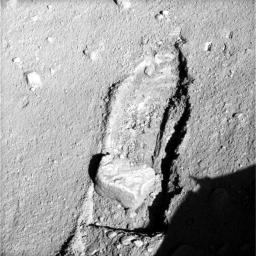
|
Rock Moved by Mars Lander Arm
- Click the image above for a larger view
- Full-Res JPEG (1024 x 1024) (233.0 kB)
- Full-Res TIFF (1024 x 1024) (1.1 MB)
Caption:
The robotic arm on NASA's Phoenix Mars Lander slid a rock out of the way during the mission's 117th Martian day (Sept. 22, 2008) to gain access to soil that had been underneath the rock.The lander's Surface Stereo Imager took the two images for this stereo view later the same day, showing the rock, called "Headless," after the arm pushed it about 40 centimeters (16 inches) from its previous location.
"The rock ended up exactly where we intended it to," said Matt Robinson of NASA's Jet Propulsion Laboratory, robotic arm flight software lead for the Phoenix team.
The arm had enlarged the trench near Headless two days earlier in preparation for sliding the rock into the trench. The trench was dug to about 3 centimeters (1.2 inches) deep. The ground surface between the rock's prior position and the lip of the trench had a slope of about 3 degrees downward toward the trench. Headless is about the size and shape of a VHS videotape.
The Phoenix science team sought to move the rock in order to study the soil and the depth to subsurface ice underneath where the rock had been.
This image was taken at about 12:30 p.m., local solar time on Mars. The view is to the north northeast of the lander.
Background Info:
The Phoenix Mission is led by the University of Arizona, Tucson, on behalf of NASA. Project management of the mission is by JPL, Pasadena, Calif. Spacecraft development was by Lockheed Martin Space Systems, Denver.
Photojournal Note: As planned, the Phoenix lander, which landed May 25, 2008 23:53 UTC, ended communications in November 2008, about six months after landing, when its solar panels ceased operating in the dark Martian winter.
Cataloging Keywords:
| Name | Value | Additional Values |
|---|---|---|
| Target | Mars | |
| System | ||
| Target Type | Planet | |
| Mission | Phoenix | |
| Instrument Host | Phoenix Lander | |
| Host Type | Lander | |
| Instrument | Robotic Arm | Solid-State Imaging (SSI) |
| Detector | ||
| Extra Keywords | Grayscale | |
| Acquisition Date | ||
| Release Date | 2008-09-23 | |
| Date in Caption | ||
| Image Credit | NASA/JPL-Caltech/University of Arizona/Texas A&M University | |
| Source | photojournal.jpl.nasa.gov/catalog/PIA11191 | |
| Identifier | PIA11191 | |
